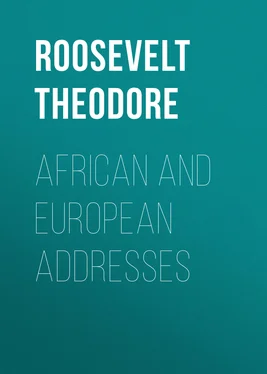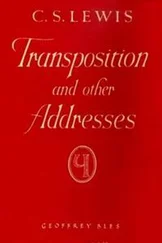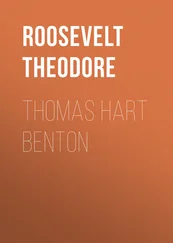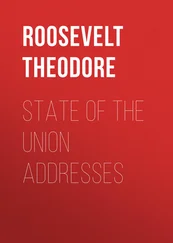Theodore Roosevelt - African and European Addresses
Здесь есть возможность читать онлайн «Theodore Roosevelt - African and European Addresses» — ознакомительный отрывок электронной книги совершенно бесплатно, а после прочтения отрывка купить полную версию. В некоторых случаях можно слушать аудио, скачать через торрент в формате fb2 и присутствует краткое содержание. Жанр: foreign_edu, Политика, на английском языке. Описание произведения, (предисловие) а так же отзывы посетителей доступны на портале библиотеки ЛибКат.
- Название:African and European Addresses
- Автор:
- Жанр:
- Год:неизвестен
- ISBN:нет данных
- Рейтинг книги:3 / 5. Голосов: 1
-
Избранное:Добавить в избранное
- Отзывы:
-
Ваша оценка:
- 60
- 1
- 2
- 3
- 4
- 5
African and European Addresses: краткое содержание, описание и аннотация
Предлагаем к чтению аннотацию, описание, краткое содержание или предисловие (зависит от того, что написал сам автор книги «African and European Addresses»). Если вы не нашли необходимую информацию о книге — напишите в комментариях, мы постараемся отыскать её.
African and European Addresses — читать онлайн ознакомительный отрывок
Ниже представлен текст книги, разбитый по страницам. Система сохранения места последней прочитанной страницы, позволяет с удобством читать онлайн бесплатно книгу «African and European Addresses», без необходимости каждый раз заново искать на чём Вы остановились. Поставьте закладку, и сможете в любой момент перейти на страницу, на которой закончили чтение.
Интервал:
Закладка:
Theodore Roosevelt
African and European Addresses
Foreword
My original intention had been to return to the United States direct from Africa, by the same route I took when going out. I altered this intention because of receiving from the Chancellor of Oxford University, Lord Curzon, an invitation to deliver the Romanes Lecture at Oxford. The Romanes Foundation had always greatly interested me, and I had been much struck by the general character of the annual addresses, so that I was glad to accept. Immediately afterwards, I received and accepted invitations to speak at the Sorbonne in Paris, and at the University of Berlin. In Berlin and at Oxford, my addresses were of a scholastic character, designed especially for the learned bodies which I was addressing, and for men who shared their interests in scientific and historical matters. In Paris, after consultation with the French Ambassador, M. Jusserand, through whom the invitation was tendered, I decided to speak more generally, as the citizen of one republic addressing the citizens of another republic.
When, for these reasons, I had decided to stop in Europe on my way home, it of course became necessary that I should speak to the Nobel Prize Committee in Christiania, in acknowledgment of the Committee's award of the peace prize, after the Peace of Portsmouth had closed the war between Japan and Russia.
While in Africa, I became greatly interested in the work of the Government officials and soldiers who were there upholding the cause of civilization. These men appealed to me; in the first place, because they reminded me so much of our own officials and soldiers who have reflected such credit on the American name in the Philippines, in Panama, in Cuba, in Porto Rico; and, in the next place, because I was really touched by the way in which they turned to me, with the certainty that I understood and believed in their work, and with the eagerly expressed hope that when I got the chance I would tell the people at home what they were doing and would urge that they be supported in doing it.
In my Egyptian address, my endeavor was to hold up the hands of these men, and at the same time to champion the cause of the missionaries, of the native Christians, and of the advanced and enlightened Mohammedans in Egypt. To do this it was necessary emphatically to discourage the anti-foreign movement, led, as it is, by a band of reckless, foolish, and sometimes murderous agitators. In other words, I spoke with the purpose of doing good to Egypt, and with the hope of deserving well of the Egyptian people of the future, unwilling to pursue the easy line of moral culpability which is implied in saying pleasant things of that noisy portion of the Egyptian people of to-day, who, if they could have their way, would irretrievably and utterly ruin Egypt's future. In the Guildhall address, I carried out the same idea.
I made a number of other addresses, some of which—those, for instance, at Budapest, Amsterdam, Copenhagen, Stockholm, and the University of Christiania,—I would like to present here; but unfortunately they were made without preparation, and were not taken down in shorthand, so that with the exception of the address made at the dinner in Christiania and the address at the Cambridge Union these can not be included.
THEODORE ROOSEVELT. SAGAMORE HILL, July 15, 1910.Introduction
In the tumult, on the one hand of admiration and praise and on the other of denunciation and criticism, which Mr. Roosevelt's tour in Africa and Europe excited throughout the civilized world, there was one—and I am inclined to think only one—note of common agreement. Friends and foes united in recognizing the surprising versatility of talents and of ability which the activities of his tour displayed. Hunters and explorers, archæologists and ethnologists, soldiers and sailors, scientists and university doctors, statesmen and politicians, monarchs and diplomats, essayists and historians, athletes and horsemen, orators and occasional speakers, met him on equal terms. The purpose of the present volume is to give to American readers, by collecting a group of his transatlantic addresses and by relating some incidents and effects of their delivery, some impression of one particular phase of Mr. Roosevelt's foreign journey,—an impression of the influence on public thought which he exerted as an orator.
No one would assert that Mr. Roosevelt possesses that persuasive grace of oratory which made Mr. Gladstone one of the greatest public speakers of modern times. For oratory as a fine art, he has no use whatever; he is neither a stylist nor an elocutionist; what he has to say he says with conviction and in the most direct and effective phraseology that he can find through which to bring his hearers to his way of thinking. Three passages from the Guildhall speech afford typical illustrations of the incisiveness of his English and of its effect on his audience.
Fortunately you have now in the Governor of East Africa, Sir Percy Girouard, a man admirably fitted to deal wisely and firmly with the many problems before him. He is on the ground and knows the needs of the country and is zealously devoted to its interests. All that is necessary is to follow his lead and to give him cordial support and backing. The principle upon which I think it is wise to act in dealing with far-away possessions is this: choose your man, change him if you become discontented with him, but while you keep him, back him up.
I have met people who had some doubt whether the Sudan would pay. Personally, I think it probably will. But I may add that, in my judgment, this does not alter the duty of England to stay there. It is not worth while belonging to a big nation unless the big nation is willing, when the necessity arises, to undertake a big task. I feel about you in the Sudan just as I felt about us in Panama. When we acquired the right to build the Panama Canal, and entered on the task, there were worthy people who came to me and said they wondered whether it would pay. I always answered that it was one of the great world-works that had to be done; that it was our business as a nation to do it, if we were ready to make good our claim to be treated as a great World Power; and that as we were unwilling to abandon the claim, no American worth his salt ought to hesitate about performing the task. I feel just the same way about you in the Sudan.
It was with this primary object of establishing order that you went into Egypt twenty-eight years ago; and the chief and ample justification for your presence in Egypt was this absolute necessity of order being established from without, coupled with your ability and willingness to establish it. Now, either you have the right to be in Egypt, or you have not; either it is, or it is not your duty to establish and keep order. If you feel that you have not the right to be in Egypt, if you do not wish to establish and keep order there, why then by all means get out of Egypt. If, as I hope, you feel that your duty to civilized mankind and your fealty to your own great traditions alike bid you to stay, then make the fact and the name agree, and show that you are ready to meet in very deed the responsibility which is yours.
There may be little Ciceronian grace about these passages, but there is unmistakable verbal power. So many words of one syllable and of Saxon derivation are used as to warrant the opinion that the speaker possesses a distinctive style. That it is an effective style was proved by the response of the audience, which greeted these particular passages (although they contain by implication frank criticisms of the British people) with cheers and cries of "Hear, hear!" It should be remembered, too, that the audience, a distinguished one, while neither hostile nor antipathetic, came in a distinctly critical frame of mind. Like the man from Missouri, they were determined "to be shown" the value of Mr. Roosevelt's personality and views before they accepted them. That they did accept them, that the British people accepted them, I shall endeavor to show a little later.
Читать дальшеИнтервал:
Закладка:
Похожие книги на «African and European Addresses»
Представляем Вашему вниманию похожие книги на «African and European Addresses» списком для выбора. Мы отобрали схожую по названию и смыслу литературу в надежде предоставить читателям больше вариантов отыскать новые, интересные, ещё непрочитанные произведения.
Обсуждение, отзывы о книге «African and European Addresses» и просто собственные мнения читателей. Оставьте ваши комментарии, напишите, что Вы думаете о произведении, его смысле или главных героях. Укажите что конкретно понравилось, а что нет, и почему Вы так считаете.












